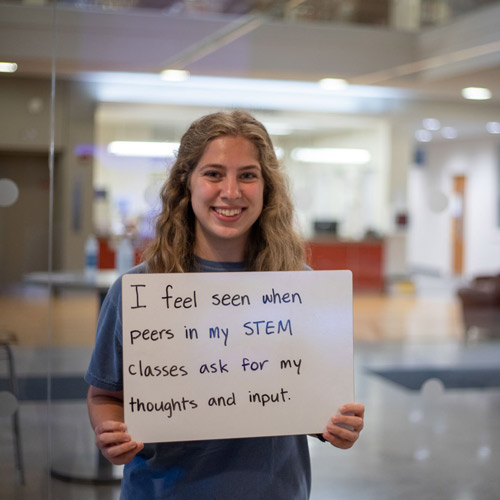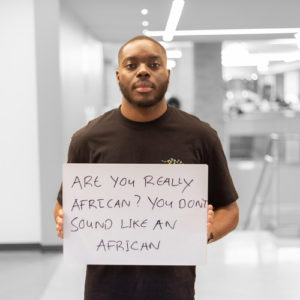
Collaborative community project raises awareness about unintentional messages found in everyday communications and their impact

Michael Miyawaki, assistant professor of sociology at The College of Wooster, is leading a Microaggressions and Microaffirmations (M&M) Project on campus to raise awareness about the impact of comments received by the recipients in positive and negative ways in everyday communications. Microaggressions, small snubs or insults communicate negative messages to recipients based on group membership, such as race, gender, religion, and sexual orientation, while microaffirmations, small gestures of inclusion and caring, convey to recipients that they are welcomed and valued. The M&M Project, funded through the Hamburger Endowment for Collaborative Projects and Program Development, involved taking pictures of students, staff, and faculty, sharing their experiences with these micro-interactions, and developing a website to feature the pictures. The project intends to create a more welcoming, caring, and understanding community at Wooster by using the website as a tool in classes and other settings.
“By raising awareness about the harmful effects of microaggressions and informing people about the power of microaffirmations, we hope that the M&M project provides an avenue for members of the Wooster community to engage in meaningful discourse by the significance of our everyday interactions,” said Miyawaki at the launch of the website during a Justice Dialogue as part of Wooster’s Martin Luther King Jr. Commemoration event series in January.
Miyawaki and his project team are excited to see the website and the messages the photos convey being integrated into classroom discussions, and possibly new student orientation and faculty and staff training programs to foster critical conversations. Panelists Denise Bostdorff, professor of communication studies, Kayla Campbell, program coordinator for the office of the vice president of equity, inclusion, and diversity, and Nadia Delacruz ’25 spoke at the launch event about their reactions to the project and why they see the new site as a powerful resource for the College community.
“This is a really powerful project because it talks about the power of our words, the power of our nonverbal communication, and our environment,” Campbell emphasized. The panel discussed the intentions, effects, and impressions the project is leaving on the campus community. The website demonstrates the value in interpreting the difference between microaggressions and microaffirmations based on the intentions behind the comment and communicating the effects of these comments. “Sometimes you don’t even realize until later or when someone is uncomfortable,” said Delacruz, talking about acknowledging the impact of microaggressions. “It shows us how small things really matter sometimes.”
The panelists also spoke about the effect of discussing multiple perspectives during personal and academic discussions. “How people perceive sentiment would be interesting to integrate as a small piece into many different courses such as intro courses in my department, but also in sociology and psychology,” said Bostdorff, elaborating on the applications of the project and the website.
 Miyawaki collaborated with Hannah Reikowsky, coordinator of the sexuality and gender inclusion program, photographers Isabel Espinosa ’23, a communications studies and global media and digital studies major who is also completing the digital and visual storytelling pathway, and Zion Vital ’24, a global media and digital studies major, and web developer Craig Akiri ’23, a computer science major, on the project. Espinosa and Vital clicked pictures of 125 students, staff, and faculty, holding written signs of their encounters with microaggressions and microaffirmations at Lowry Center. Akiri created the website to include pictures taken, details about the project, the steps taken, and the eminent team involved in it.
Miyawaki collaborated with Hannah Reikowsky, coordinator of the sexuality and gender inclusion program, photographers Isabel Espinosa ’23, a communications studies and global media and digital studies major who is also completing the digital and visual storytelling pathway, and Zion Vital ’24, a global media and digital studies major, and web developer Craig Akiri ’23, a computer science major, on the project. Espinosa and Vital clicked pictures of 125 students, staff, and faculty, holding written signs of their encounters with microaggressions and microaffirmations at Lowry Center. Akiri created the website to include pictures taken, details about the project, the steps taken, and the eminent team involved in it.
The team continues to invite additional faculty, staff, and students to take part in the project. Participants can share past experiences with microaggressions and microaffirmations, and related messages they would like to convey to the Wooster community. Appointments can be scheduled through this form. For further information related to the project and participation, visit the M&M Project website or contact mmproject@wooster.edu.
Posted in News on February 8, 2023.
Related Posts
Related Areas of Study
Sociology
The study of social life, social change, and the social causes and consequences of human behavior.
Major MinorGlobal Media & Digital Studies
Digital technology, mass media and film studies are part of a dynamic, interdisciplinary course of study
Major MinorDigital & Visual Storytelling
Tell stories using digital and visual media and find a career that fits your passion
PathwayComputer Science
Solve complex problems with creative solutions using computer programming and applications
Major Minor

